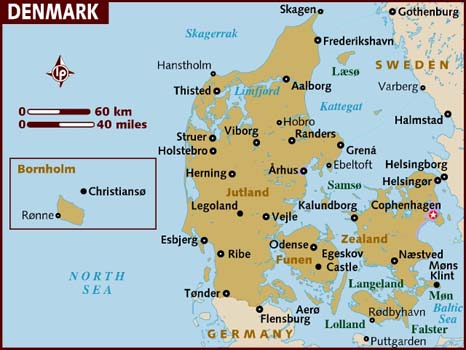Denmark’s new “migrant island”
December 7, 2018 | Expert Insights

Denmark’s right-leaning coalition government announced that the island of Lindholm will house about 100 migrants, mostly asylum seekers who cannot be deported.
Since 1926, Lindholm island has housed stables, a laboratory for the study of contagious animal diseases and a crematorium for dead pigs and cows.
Background
Denmark is a Nordic country and the southernmost of the Scandinavian nations. The sovereign state is south-west of Sweden and south of Norway and bordered to the south by Germany. The Kingdom of Denmark also comprises two autonomous constituent countries in the North Atlantic Ocean: the Faroe Islands and Greenland. Denmark proper consists of a peninsula, Jutland, and an archipelago of 443 named islands, with the largest being Zealand, Funen and the North Jutlandic Island. The islands are characterised by flat, arable land and sandy coasts, low elevation and a temperate climate.
Denmark is considered to be one of the most economically and socially developed countries in the world. Danes enjoy a high standard of living and the country ranks highly in some metrics of national performance, including education, health care, protection of civil liberties, democratic governance, prosperity, and human development.
Denmark is a parliamentary representative democracy, a constitutional monarchy and a decentralised unitary state in which the monarch of Denmark, Queen Margrethe II, is head of state. After the 2015 General Elections, the ruling Social Democrats remained the largest party in the Folketing and increased the number of seats they held, but the opposition Venstre party was able to form a minority government headed by Lars Løkke Rasmussen with the support of the right-wing Danish People's Party.

Analysis
Under the proposal, Lindholm would be decontaminated in 2019 and set up to house about 100 people by 2021. Danish Finance Minister Kristian Jensen denied that the island was a prison, but acknowledged that those assigned there would have to sleep there. And Martin Henriksen, a member of the anti-immigration Danish People’s Party, said the party planned to “minimize the number of ferry departures as much as at all possible,” according to the New York Times. The move has sparked outrage from human rights groups who say it is inhumane and may violate international law. (The Geneva Conventions prohibit unlawful confinement.)
“It is important to note that these people, while they have committed crimes, have already served their sentence,” Louise Holck, deputy director of the Danish Institute for Human Rights, told CNN. “There is no grounds for detention, and from a human rights perspective, we are not just talking about windows with bars . . . We will have to assess that they are not detained de facto.”
The United Nations High Commissioner for human rights, Michelle Bachelet, expressed concern regarding the plan Wednesday, saying she will discuss it with the government. “We’ve seen the negative impact of such policies of isolation, and [they] should not replicate these policies. Because depriving them of their liberty, isolating them, and stigmatizing them will only increase their vulnerability,” she said, reported Reuters.
Henriksen told the Associated Press that the plan is meant to “signal to the world that Denmark is not attractive” for migrants. Denmark has, like much of Europe, hardened its immigration policies since a large influx of Middle Eastern and African migrants fleeing war and persecution flooded the continent in 2015 and 2016. In those years, 14,792 and 21,316 people respectively applied for asylum in Denmark. But that number fell to 3,458 by 2017, according to Local Denmark.
That decline coincides with a drop in migration across Europe. But it could also have something to do with Denmark’s increasingly draconian policies. Since 2015, the Danish government has passed several laws designed to make life hard for foreigners, prompting the Atlantic to label it “Western Europe’s least attractive country for refugees."
In 2016, parliament passed a law that allowed immigration officials to seize assets exceeding $1,450 from asylum seekers to help pay for their presence in the country. Denmark has also cut social benefits to refugees and immigrants, and some towns have made it mandatory that public institutions serve pork, which some practising Muslims don’t eat. In August, the country enacted a burqa ban, legislation critics saw as discriminatory toward the country’s growing Muslim population.
Assessment
Our assessment is that Denmark is struggling to incorporate the migrants into their society using conventional resettlement programs. We believe that this proposal is the brainchild of the right-wing Danish People’s Party, who is a part of the minority government and harbours a nationalistic agenda.








Comments